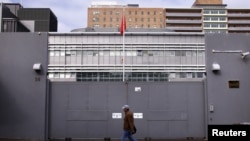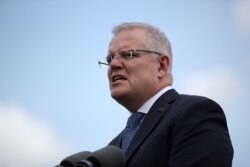Australia is suspending its extradition treaty with Hong Kong in response to the new national security law imposed on the city by China.
In announcing the move Thursday, Prime Minister Scott Morrison said Canberra will extend temporary visas for an additional five years for the 10,000 Hong Kong citizens currently studying and working in Australia, and allow them to apply for permanent residency after that time.
Morrison also said the government will begin efforts to encourage businesses operating in Hong Kong to relocate to Australia in light of the new security law.
“Australia has always been a very welcoming country to such people,” Morrison said.
Under the new law, anyone in Hong Kong believed to be carrying out terrorism, separatism, subversion of state power or collusion with foreign forces could be tried and face life in prison. The new law was a response to the massive and often violent pro-democracy demonstrations that engulfed the financial hub in the latter half of last year.
Western governments and human rights advocates say the measure effectively ends the “One Country, Two Systems” policy under which Hong Kong was promised a high degree of autonomy after the handover from British to Chinese rule in 1997.
Canberra has revised its travel advisory for Hong Kong, warning Australians they may be “at risk of detention on vaguely defined national security grounds,” and face possible expatriation to mainland China “for prosecution under mainland law.”
Australia’s Foreign Ministry has also warned the 100,000 expatriates who live and work in Hong Kong “to reconsider your need to remain” in the city.
The Chinese Embassy in Canberra issued a statement warning Australia “to immediately stop meddling in Hong Kong affairs and China’s internal affairs under any pretext or in any way. Otherwise it will lead to nothing but lifting a rock only to hit its own feet.”
Australia previously extended residency rights to tens of thousands of Chinese students living there when Chinese troops violently drove out pro-democracy protesters in Tiananmen Square in 1989.
Relations between Canberra and Beijing are already strained over Canberra’s push for an independent probe into the origins of the coronavirus pandemic, which was first detected last year in the central Chinese city of Wuhan.
Beijing has imposed heavy tariffs on Australian barley and suspended Australian beef imports in apparent retaliation.
Other Western governments have taken similar steps in response to Beijing’s push to bring Hong Kong further under its autocratic rule. Canada has suspended its extradition treaty with the territory, while Britain has offered residency for up to 3 million Hong Kongers eligible for British citizenship under the 1997 agreement.
New Zealand also announced Thursday that it was reviewing all of its “policy settings with respect to Hong Kong,” including extradition agreements, trade and travel.






